#Bithynians
Explore tagged Tumblr posts
Text
Hey have a fun notes accomplishment game thing!
0 notes: free pizza for everyone
-5 notes: I suffocate peelon muskrat with garlic bread
-0.5 notes: I release the prisoners
-0.005 notes: I confess my undying love to Jar Jar Binks
π notes: I kickstart French Revolution 2
An unspecified number between 1 and 72.3 notes: I kickstart Puerto Rico Nationalist Party Revolts of October 30, 1950 2.0
30^11 notes: Bithynian Rebellion 2.0
123 notes: I cryogenically freeze myself
-21 notes: I solve the Riemann Hypothesis
-17 notes: I kidnap the Prince of Monaco
-18 notes: I assassinate the Prince of Monaco
87 notes: I clean my room
i notes: death to humanity
1 note: I end climate change
max 300 notes per person, thanks everyone:)
91 notes
·
View notes
Text
Nurses and Caretakers of the Gods. Part II: Ares and Hephaistos.
(As always, if you know any more sourced versions, I'd love it if you let me know!!!) Part I here.
Ares:
A quick overview of versions of his birth: he is almost universally the son of Zeus and Hera both (e.g. Hom. Il. 5.893, Hes. Th. 922–923; Apollod. 1.3.1), though he is also attested as solely born of Hera (in response to the birth of Athena after touching a prodigious flower from Olenos: Ovid. Fast. 5. 255), solely born of Zeus (after drinking the "male begetting" waters of the Nile: Schol. Aesch. Suppliant Women 855–856) or born of Enyo (Schol. Il. 5.156, Cornutus. Greek Theology. 21, see bellow, Enyo is curiously also attested as an epithet of Hera in Tzetzes ad Lycophron 493 and 519, perhaps in an attempt to reconcile both accounts). He is frequently said to have been born and/or raised in Thrace (e.g. Statius Thebaid 4.786). A fragment from a lost play by Aeschylus perhaps intends to paint a picture of his younger days:
DIKE: (...) Hera has reared a violent son whom she has borne to Zeus, a god irascible, hard to govern, an one whose mind knows no respect for others. He shot wayfarers with deadly arrows, and ruthlessly hacked ... with hooked spears ... he rejoiced and laughed ... evil ... scent of blood ... [Two lines unintelligible] ... is therefore justly called ..." (Aeschylus, Fragment 282. The passage likely seeks to etymologises the name Ares from ἀρή [bane, ruin, curse]) the vicious little psycho
1. Nursed by Thero (Beastly): "Of all the objects along this road the oldest is a sanctuary of Ares. This is on the left of the road, and the image is said to have been brought from Colchis by the Dioscuri. They surname him Theritas after Thero, who is said to have been the nurse of Ares. Perhaps it was from the Colchians that they heard the name Theritas, since the Greeks know of no Thero, nurse of Ares." (Paus. 3.19.7-8)
2. Nursed—among other things—by Enyo: "Accounts of Enyo differ; for some she is the mother of Ares, some his daughter, some his nurse" (Cornutus Compendium of Greek Theology, 21). Elsewhere she is also his sister (Quintus. Fall of Troy 424) or his lover, begetting Enyalios (Eustathius on Homer p.944) she is his everything, literally.
3. Raised and taught the arts of dance and war by Priapos (incredibly enough), a deity originally worshipped in the city of Lampsakos (in the northern Troad), who after spreading throughout the classical world was primarily known as a rustic god with massive genitals:
"According to a Bithynian legend, which agrees well with this Italian institution, Priapos, a war-like divinity (probably one of the Titans, or of the Idaean Dactyls, whose profession it was to teach the use of arms), was entrusted by Hera with the care of her son Ares, who even in childhood was remarkable for his courage and ferocity. Priapos would not put weapons into his hands till he had turned him out a perfect dancer; and he was rewarded by Hera with a tenth part of all Ares’s spoils." (Lucian. On Dance 21)
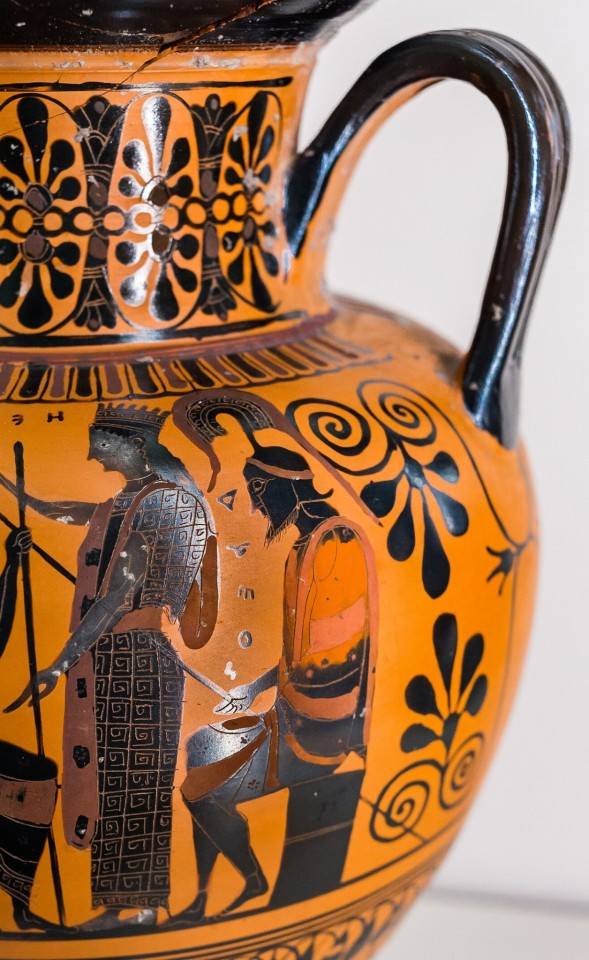
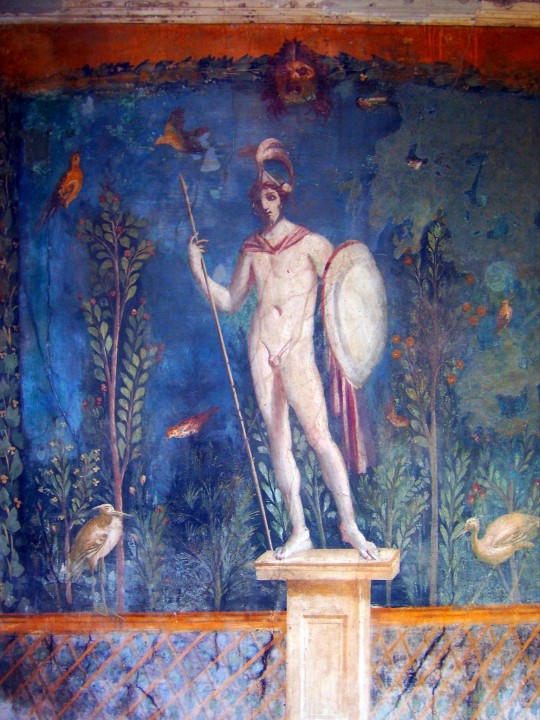
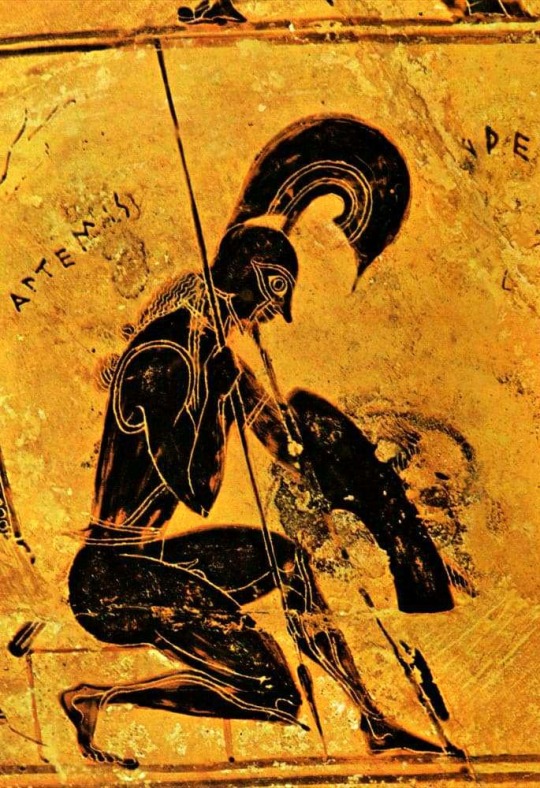
Hephaistos:
Versions of his birth are more or less split evenly between him being the son of both Zeus and Hera (e.g. Hom. Il. 1.578, 14.338, 18.396. Od. 8.312.) or solely of Hera (Hes. Theog. 929, Apollod. 1.3.5, Hygin. Fab. Praef.), likely in response to the birth of Athena, or else preceeding it due of an unexplained quarrel (Hes. Fragment 343 MW). Regarding detalis of his parthenogenic conception: "Hera, without any man, being lifted up by the wind gave birth to Hephaistos" (Lucian. De sacrificiis 6), and regarding details on the the birth, it's sometimes said to have been from her thigh (Serv. Aen. 8.454). A quaint tale that tries to reconcile both traditions (Schol.bT. Il. 14.296) claims that Zeus and Hera secretly slept together on the island of Samos before they were married. After being oficially given in marriage to Zeus by Okeanos and Tethys, Hera bore Hephaistos, and to conceal their premarital dalliance she pretended that she'd birthed him without need of a father. To finish off, odd genealogies abound which I'm not really going to include, for example Paus. 8.53.5 or Cicero. De Nat. Deor. 3.22.
1. In most accounts he's raised for nine years by Thetis and Eurynome, after being thrown off Olympos at birth by Hera for being lame (main source is Hom. Il. 18.394-405):
"She [Thetis] saved me when I suffered much at the time of my great fall through the will of my own brazen-faced mother, who wanted to hide me for being lame. Then my soul would have taken much suffering had not Eurynome and Thetis caught me and held me, Eurynome, daughter of Okeanos, whose stream bends back in a circle. With them I worked nine years as a smith, and wrought many intricate things; pins that bend back, curved clasps, cups, necklaces, working there in the hollow of the cave, and the stream of Okeanos around us went on forever with its foam and its murmur. No other among the gods or among mortal men knew about us except Eurynome and Thetis. They knew since they saved me." (Trans. Lattimore)
I ship them. Many later accounts confuse both versions of his fall (see below), and so sometimes Thetis and Eurynome recieve him after he's hurled off Olympus by Zeus, presumably as an adult (e.g. Apollod. 1.3.5). Also a variation is found where Hephaestus is raised by Thetis and the rest of the Nereids:
"But my son Hephaestus whom I bare was weakly among all the blessed gods and shrivelled of foot, a shame and disgrace to me in heaven, whom I myself took in my hands and cast out so that he fell in the great sea. But silver-shod Thetis the daughter of Nereus took and cared for him with her sisters: would that she had done other service to the blessed gods!" (Homeric Hymn 3. 311-330)
2. According to the other main variant of his fall, Hephaistos is hurled off Olympos by Zeus after he tries to intervene on his mother's behalf during one of their quarrels (Homer, Iliad 1. 568), presumably to save her from a beating (Plato, Republic 378d), or specifically to free her after she'd been chained and hung from heaven (eg. Apollod. 1.3.5). In this version he falls on the island of Lemnos, and is nursed back to health by the tribe of Sintians (V. Fl. Argonautica. 2.8.5, Hom. Il. 1.590 is quoted below):
"There was a time once before now I was minded to help you [Hera], and he [Zeus] caught me by the foot and threw me from the magic threshold, and all day long I dropped helpless, and about sunset I landed in Lemnos, and there was not much life left in me. After that fall it was the Sintian men who took care of me." (Trans. Lattimore)
As mentioned before both versions were frequently mixed up, being basically doubles of eachother (either Hephaistos is cast out because he's lame or lame because he's cast out), so sometimes he is raised as a child by the Sintians (e.g. Serv. ad. Eclog. 4.62, where he is cast out by Jupiter because Juno rejects him at birth, and so comes to fall on Lemnos).
3. Finally, there is a version where he is entrusted by Hera to the obscure Kedalion, a daimon who had his workshop on the island of Naxos. Hephaistos apprenticed and learnt to work bronze under his tutelage (Eustathius ad Homer, Il. 14.296a). Elsewhere Kedalion is an assistant in Hephaistos' workshop, who is given as a guide to the blind giant Orion so that, standing on his shoulders, he may lead him to the Sun and be healed (Serv. Aen. 10.763, Ps. Eratosthenes. Catast. fr. 32, Orion = Hes. Ast. fr 4, Hyg. Ast. 2.34.3, Sophocles also told this tale in a lost satyr play that bore Kedalion's name).
4. (Edit) Not necessarily raising, but I thought the detail of the Kyklopes teaching him and Athena "all crafts, as many as the skies contain" is really cute (Orphic Fragment 179 Kern)
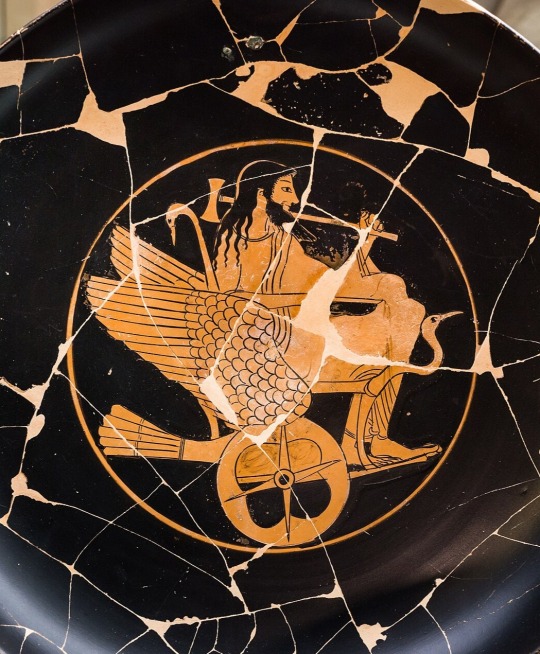
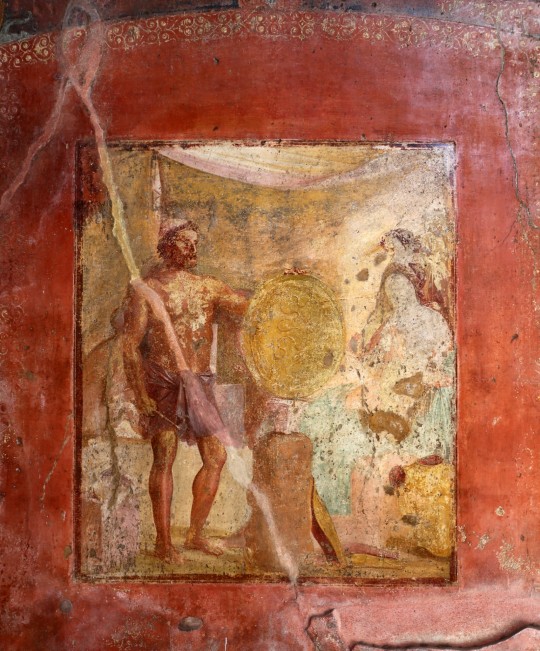
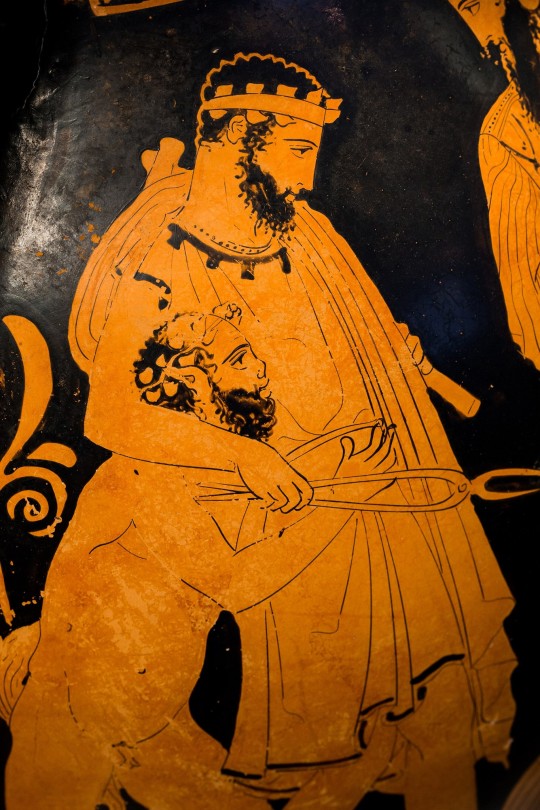
#greek mythology#greek myths#greek gods#tagamemnon#hellenic deities#nurses and caretakers#Ares#Hephaestus#Hephaistos#Thero#Enyo#Priapos#Thetis#Eurynome#Kedalion#Hera#Zeus#ancient art#greek pottery
86 notes
·
View notes
Text
Today's third lecture on Alcibiades' adventures
On the following day Alcibiades set up a trophy of victory and plundered the territory of Pharnabazus, no one venturing to defend it. He even captured some priests and priestesses, but let them go without ransom. On setting out to attack Chalcedon, which had revolted from Athens and received a Lacedaemonian garrison and governor, he heard that its citizens had collected all their goods and chattels out of the country and committed them for safe keeping to the Bithynians, who were their friends. So he marched to the confines of Bithynia with his army, and sent on a herald with accusations and demands. The Bithynians, in terror, gave up the booty to him, and made a treaty of friendship. While Chalcedon was being walled in from sea to sea, Pharnabazus came to raise the siege, and at the same time Hippocrates, the Spartan governor, led his forces out of the city and attacked the Athenians. But Alcibiades arrayed his army so as to face both enemies at once, put Pharnabazus to shameful flight, and slew Hippocrates together with many of his vanquished men. Then he sailed in person into the Hellespont and levied moneys there. He also captured Selymbria, where he exposed himself beyond all bounds. For there was a party in the city which offered to surrender it to him, and they had agreed with him upon the signal of a lighted torch displayed at midnight. But they were forced to give this signal before the appointed time, through fear of one of the conspirators, who suddenly changed his mind. So the torch was displayed before his army was ready; but Alcibiades took about thirty men and ran to the walls, bidding the rest of his force follow with all speed. The gate was thrown open for him and he rushed into the city, his thirty men-at‑arms reinforced by twenty targeteers, but he saw at once that the Selymbrians were advancing in battle array to attack him. In resistance he saw no safety, and for flight, undefeated as he was in all his campaigns down to that day, he had too much spirit. He therefore bade the trumpet signal silence, and then ordered formal proclamation to be made that Selymbria must not bear arms against Athens. This proclamation made some of the Selymbrians less eager for battle, if, as they supposed, their enemies were all inside the walls; and others were mollified by hopes of a peaceful settlement. While they were thus parleying with one another, up came the army of Alcibiades. Judging now, as was really the case, that the Selymbrians were disposed for peace, he was afraid that his Thracian soldiers might plunder the city. There were many of these, and they were zealous in their service, through the favour and good will they bore Alcibiades. Accordingly, he sent them all out of the city, and then, at the plea of the Selymbrians, did their city no injury whatever, but merely took a sum of money from it, set a garrison in it, and went his way.
1. Capturing preists and priestesses and letting them go without ransom
2. Extracts supplies for his army from a city using 1 herald.
3. Wins a battle where he's being attacked by two sides.
4. Puts himself in huge risk, when things get dangerous he just. Signals for silence so he can buy some time and succeeds.
5. Makes sure there's no plundering happening in a city he's just taken over.
10 notes
·
View notes
Text
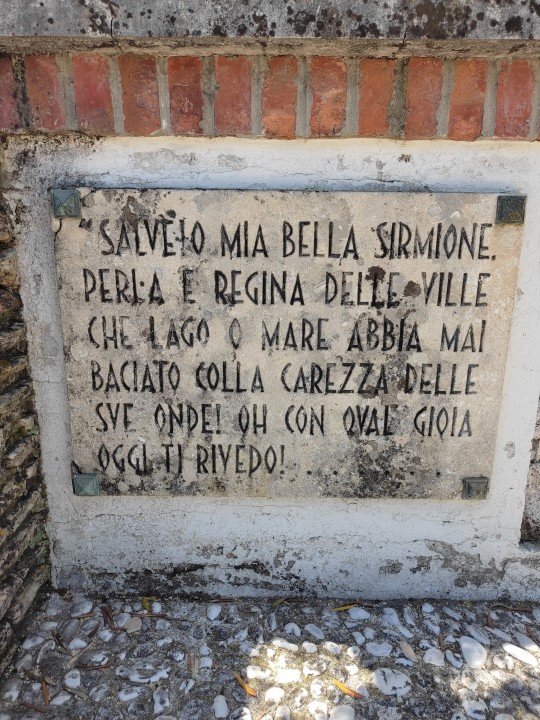
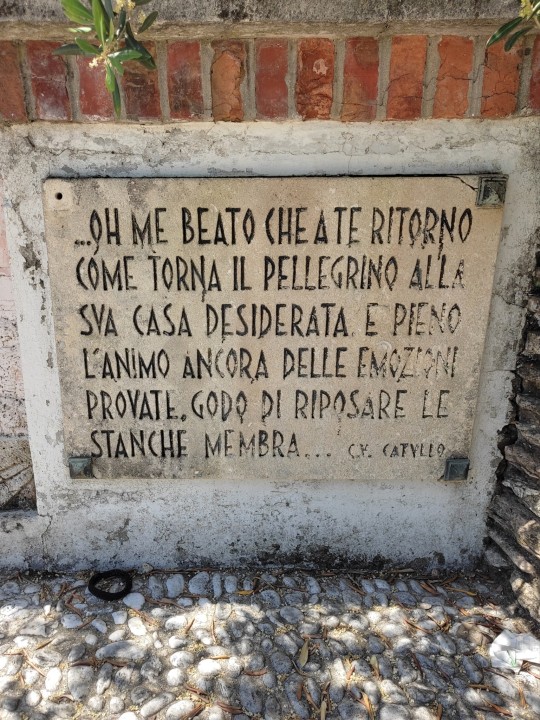
Wild Catullus' Carmina 31 spotted in Sirmione ❤️
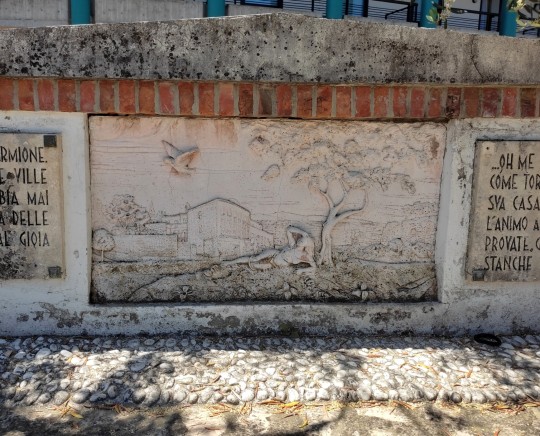
Lesbia, presumably?
Ad Sirmium Insulam
(Translation by Douglas Thornton)
Of the islands which in stagnant
Waters and vast seas Neptune holds,
Sirmio—the pearl of islands!—
Now my heart with you rejoices
Safe and sound, still scarce believing
Thynia and Bithynian
Fields have gone. What more fortunate
Care, after so many struggles,
When the mind shrugs off its burden,
Drained by foreign toil, than come
Unto our hearth and find comfort
In our longed-for bed! Thus hello,
Charming Sirmio, whom I enjoy
Enjoying; and you, rippling lake
Of Lydian wave surrounding
My home, drown out all other noise.
#Catullus#poems#tagamemnon#gaius valerius catullus#classics#classical studies#latin#italy#sirmione#roman republic
12 notes
·
View notes
Text
Seleukid War Elephants VS Celts: The Battle of the Elephants (c. 275-268 BCE)
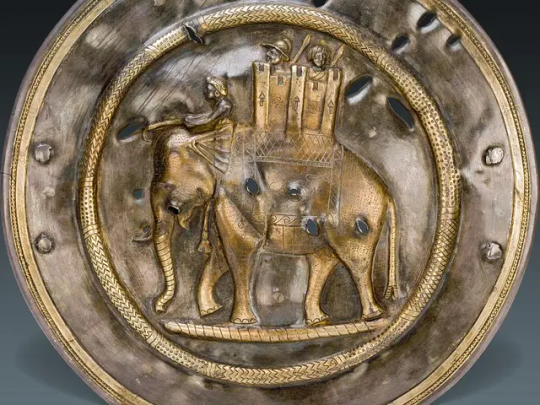
After Lysimachos’ defeat at Corupedium in 281 BCE, Seleukos became the master of nearly all of Asia Minor and Thrace. The road to the Macedonian heartland lay open before him. However, his chances to consolidate his rule in these regions and to be proclaimed king in his homeland were cut short when he was assassinated by Ptolemy Keraunos. Keraunos, originally the heir to the Ptolemaic Empire, had been set aside in favor of his younger brother, Ptolemy II Philadelphos. Seeking refuge, the Ptolemaic outcast fled to Seleukos, but the ungrateful prince harbored ambitions for a kingdom of his own. To achieve this, he assassinated his protector and exploited the ensuing chaos to seize control of Macedon.
Keraunos’ reign was brief but eventful. During his kingship, the Galatians—a confederacy of Celtic tribes gathered at the northern border of the Hellenic world—invaded Macedon and Greece. In 279 BCE, Keraunos was killed in battle against them. The Galatians then continued their advance towards Byzantion on the Bosphorus.
Meanwhile, Antiochos I (r. 281-261 BCE) succeeded his father as the new king of the vast Seleukid Empire. Antiochos, likely driven by a desire to punish Keraunos and claim Lysimachos’ former territories, was delayed by a revolt in Syria. As a result, he was compelled to accept a peace agreement with Keraunos, effectively relinquishing his claim to Macedon and Thrace, which were now under the rule of the new Macedonian king.
In the meantime, Antiochos dispatched his general Patrokles to oversee Seleukid affairs in Asia Minor. Here, the primary threat was not Keraunos but the rising power of the Bithynian kingdom. Antiochos’ campaign did not begin well, as a segment of the Seleukid army was defeated by the Bithynians.
After successfully quelling the rebellion in Syria, Antiochos traveled to Asia Minor, where he established himself in Sardis, which served as his regional capital. The king faced a formidable alliance led by the new Bithynian king, Nikomedes I, who had joined forces with Heraclea Pontica and Antigonos Gonatas, the new king of Macedonia. However, Bithynia’s alliance with Gonatas was short-lived, as Macedonia was soon beset by marauding Celtic tribes. The Macedonian king made peace with the Seleukids and turned his attention to domestic affairs.
Nikomedes, now isolated and still contending with his rebellious younger brother, resorted to desperate measures. In 278 BCE, he invited the Galatians into his kingdom to serve as mercenaries in his army. Some 20,000 Celts, led by Leonnorius and Lutarius, crossed the Bosphorus and aided Nikomedes in defeating his brother. However, this victory presented Nikomedes with a new challenge: what to do with the fierce Celtic warriors now in his kingdom? To resolve this, he pushed them to the south, effectively making them Antiochos’ problem.
The Celtic tribes were a serious menace to the city-states and countryside (chôra) of Western Anatolia. This fear for the Galatians is reflected in some inscriptions from the 270s BCE (Mitchell 1993: 1.15-18). Antiochos I decided to confront them and defeated them in the so-called “Battle of the Elephants”, sometime between 275 and 268 BCE.
Details about this encounter are scarce. Our main source is the 2nd-century writer Lucian of Samosata, who wrote the short essay Zeuxis. In this piece, the Greek author expresses his frustration at being praised for the novelty of his work rather than its inherent qualities. I will discuss this essay in greater detail in a future article.
In any case, Lucian describes how Antiochos defeated the Celts using his secret weapon: 16 war elephants. When the Celts attacked with their cavalry and chariots, the Seleukid monarch unleashed these massive beasts. The sight of the elephants, creatures the Celts had never encountered before, struck fear into their hearts. The Celts’ horses panicked, turned around, and fled into their own ranks, causing chaos among their forces.
While the historical accuracy of these details is uncertain, it is generally agreed that the victory can indeed be attributed to Antiochos’ use of elephants. The Seleukid triumph was celebrated in Asia Minor through depictions of elephants. Workshops in Myrina, a town near Pergamon, for example, produced various figurines portraying elephants trampling Celtic warriors, emphasizing the decisive role these animals played in the battle. Pierre Bienkowski, in his Les Celtes dans les arts mineurs gréco-romains, argues that these portrayals of the battle can be traced back to a trophy erected by Antiochos after his victory, as reported by Lucian.
“ἔπι τε τῷ τροπαίῳ κελεύει ἄλλο μηδέν, ἐλέφαντα δὲ μόνον ἐγκολάψαι.” (Zeuxis 11)
“He (Antiochos) then ordered the trophy to be decorated with nothing else, except for an elephant.”
It is also possible that Antiochos' coins depicting an elephant commemorate this victory:

According to Appian, Antiochos received the title “Sôter” (“Savior”; “σωτήρ”) after this triumph, emphasizing his role as savior of Hellenic civilization against these "barbarians":
“ὃς καὶ Σωτὴρ ἐπεκλήθη Γαλάτας ἐκ τῆς Εὐρώπης ἐς τὴν Ἀσίαν ἐσβαλόντας, ἐξελάσας” (Syrian Book 65)
“He was called “the Savior” after he had driven off the Galatians who had invaded Asia from Europe”
This claim by Appian is very plausible. A similar thing happened with Antigonos Gonatas, who was granted this meaningful title after defeating an army of Galatians in 277 BCE, establishing a precedent for such honors following a triumph over the Celts. Furthermore, later Anatolian inscriptions from the 260s BCE begin referring to Antiochos I as "Sôter." This suggests that the Seleukid monarch had accomplished something worthy of this title—most likely his victory over the Celts.
In any case, after their defeat, the Celts were driven to the remote region of Northern Phrygia, where they remained for the rest of their history. Despite this victory, Antiochos' situation in Asia Minor deteriorated when war broke out with the Ptolemies during the First Syrian War (274–271 BCE). The capable Ptolemy II Philadelphos seized large swathes of territory from the Seleukids along the southern Anatolian coast.
Olivier Goossens
Main sources:
-Will, E., Histoire politique du monde hellénistique, 2nd ed., 1979-82, Nancy.
-Mitchell, S., “The Galatians: Representation and Reality”, A Companion to the Hellenistic World, ed. A. Erskine, 2003, Oxford, pp. 280-293.
-Bienkowski, P., Les celtes dans les arts mineurs greco-romains, 1928, Krakow.
-Loeb: Lucian, Volume VI, trans. K. Kilburn, 1959, Harvard (MA);
2 notes
·
View notes
Text
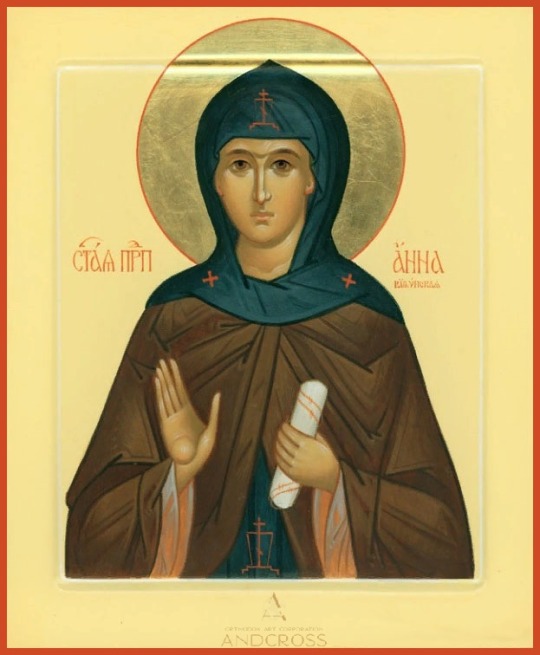
+++🙏🏻God Bless🕊️+++
Venerable Anna (Euthymian) Bithynian
MEMORIAL DAY NOVEMBER 11
💫International Orthodox Art Corporation Andcross May the blessing of the Lord be upon you!
#orthodox christmas#orthodox church#orthodoxia#russian orthodox#iconofaday#jesus#orthodox christian#orthodox#greek orthodox#orthodox icon
6 notes
·
View notes
Text
Saint of the Day – 3 April – Saint Nicetas of Medicion (c760-824) Abbot
Saint of the Day – 3 April – Saint Nicetas of Medicion (c760-824) Abbot of Medicion Abbey in Bithynia (in modern Turkey). Born in c760 in Bithynian, Caesarea and died in 824 of natural causes in Constantinople. Also known as –Nicetas of Constantinople, Nicetas the Confessor, Niketas… Nikita… His name is of Greek origin and means “victorious.” The Roman Martyrology reads: “In the Monastery of…
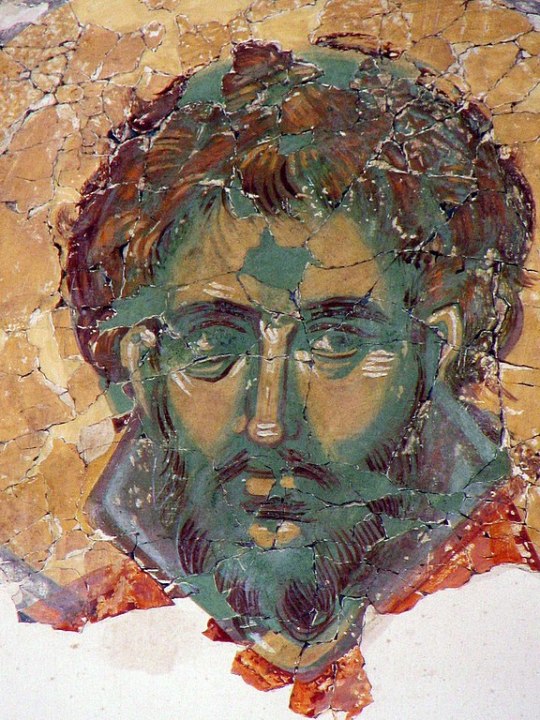
View On WordPress
5 notes
·
View notes
Note
For real? :0

Fact-checked by real Bithynian patriots.
5 notes
·
View notes
Text
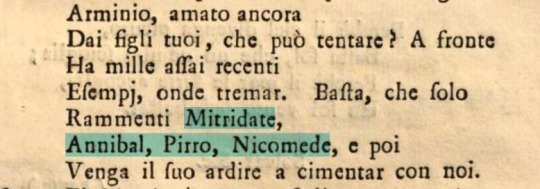
...One of these is not like the others? Was Caesar so abominably talentless in bed as to merit comparison with the disasters dealt by Rome to Pyrrhus, Hannibal, and Mithridates?
Signore Pasquini, please come back and share your thought process!
[For the record, I know four Bithynian kings called Nicomedes, and none of them were enemies of Rome, in fact more often than not they were allies. Am I missing some other famous Nicomedes?]
3 notes
·
View notes
Text
SAINTS&READING: WEDNESDAY, APRIL 16, 2025
april 15_april 3
Passion Week: Great Wednesday. By Monastic Charter: Strict Fast (Bread, Vegetables, Fruits)
VENERABLE NICETAS THE CONFESSOR, ABBOT OF MEDIKION (824)

Saint Niketas (Nikḗtas) the Confessor was born in Bithynian Caesarea (northwest Asia Minor) of a pious family. His mother died eight days after his birth, and his father Philaretos became a monk. The child remained in the care of his grandmother, who raised him in a true Christian spirit. From his youth Saint Niketas attended church and was a disciple of the hermit Stephanos. With his blessing, Saint Niketas set off to the Mydicia monastery, where Saint Nikephoros (Nikēphóros) (March 13) was the igumen.
After seven years of virtuous life at the monastery, famed for its strict monastic rule, Saint Niketas was ordained presbyter. Saint Nikephoros, knowing the holy life of the young monk, entrusted to him the guidance of the monastery when he himself became ill.
Not wanting power, Saint Niketas devoted himself to the enlightenment and welfare of the monastery. He guided the brethren by his own example. Soon the fame of the lofty life of its inhabitants of the monastery attracted many seeking salvation. After several years, the number of monks had increased to one hundred.
When Saint Nikephoros departed to the Lord in his old age, the brethren unanimously chose Saint Niketas as igumen.
The Lord granted Saint Niketas the gift of wonderworking. Through his prayer a deaf-mute child received the gift of speech; two demon-possessed women were healed; he restored reason to one who had lost his mind, and many of the sick were healed of their infirmities.
During these years under the emperor Leo the Armenian (813-820), the Iconoclast heresy resurfaced and oppression increased. Orthodox bishops were deposed and banished. At Constantinople a council of heretics was convened in 815, at which they deposed the holy Patriarch Nikephoros (806-815), and in his place they chose the heretical layman Theodotus. They also installed heretics in place of exiled and imprisoned Orthodox bishops.
The emperor summoned all the heads of the monasteries and tried to bring them over to the Iconoclast heresy. Among those summoned was Saint Niketas, who stood firmly for the Orthodox confession. Following his example, all the igumens remained faithful to the veneration of holy icons. Therefore, they threw him into prison. Saint Niketas bravely underwent all the tribulations and encouraged firmness of spirit in the other prisoners.
Then the emperor and the false patriarch Theodotus attempted to trick those who remained faithful to Orthodox teaching. They promised that the emperor would give them their freedom and permit the veneration of the icons on one condition: that they take Communion from the pseudo-patriarch Theodotus.
For a long time the saint had doubts about entering into communion with a heretic, but other prisoners begged him to go along with them. Acceding to their entreaties, Saint Niketas went into the church, where icons were put out to deceive the confessors, and he accepted Communion.
But when he returned to his monastery and saw that the persecution against icons was continuing, he then repented of his deed, returned to Constantinople and fearlessly denounced the Iconoclast heresy. He ignored all the emperor’s threats.
Saint Niketas was again locked up in prison for six years until the death of the emperor Leo the Armenian. Enduring hunger and travail, Saint Niketas worked miracles by the power of his prayers: through his prayer the Phrygian ruler released two captives without ransom; three shipwrecked men for whom Saint Niketas prayed, were thrown up on shore by the waves.
Saint Niketas reposed in the Lord in 824. The saint’s body was buried at the monastery with reverence. Later, his relics became a source of healing for those coming to venerate the holy confessor.
VENERABLE JOSEPH THE HYMNOGRAPHER OF SICILY (883)

Saint Joseph the Hymnographer, “the sweet-voiced nightingale of the Church,” was born in Sicily around the turn of the 9th century into a pious Christian family. His parents, Plotinos and Agatha, moved to the Peloponnesos to save themselves from barbarian invasions. When he was fifteen, Saint Joseph went to Thessalonica and entered the monastery of Latomos. He was distinguished by his piety, his love for work, and his meekness; and he gained the good will of all the brethren of the monastery. He was later ordained as a priest.
Saint Gregory the Dekapolite (November 20) visited the monastery and took notice of the young monk, taking him along to Constantinople, where they settled together near the church of the holy Martyrs Sergius and Bacchus. This was during the reign of the emperor Leo the Armenian (813-820), a time of fierce iconoclast persecution.
Saints Gregory and Joseph fearlessly defended the veneration of holy icons. They preached in the city squares and visited in the homes of the Orthodox, encouraging them against the heretics. The Church of Constantinople was in a most grievous position. Not only the emperor, but also the patriarch were iconoclast heretics.
At that time the Roman bishops were in communion with the Eastern Church, and Pope Leo III, who was not under the dominion of the Byzantine Emperor, was able to render great help to the Orthodox. The Orthodox monks chose Saint Joseph as a steadfast and eloquent messenger to the Pope. Saint Gregory blessed him to journey to Rome and to report on the plight of the Church of Constantinople, the atrocities of the iconoclasts, and the dangers threatening Orthodoxy.
During the journey, Saint Joseph was captured by Arab brigands who had been bribed by the iconoclasts. They took him to the island of Crete, where they handed him over to the iconoclasts, who locked him up in prison. Bravely enduring all the deprivations, he encouraged the other prisoners. By his prayers, a certain Orthodox bishop who had begun to waver was strengthened in spirit and courageously accepted martyrdom.
Saint Joseph spent six years in prison. On the night of the Nativity of Christ in 820 he was granted a vision of Saint Nicholas of Myra, who told him about the death of the iconoclast Leo the Armenian, and the end of the persecution.
Saint Nicholas gave him a paper scroll and said, “Take this scroll and eat it.” On the scroll was written: “Hasten, O Gracious One, and come to our aid if possible and as You will, for You are the Merciful One.” The monk read the scroll, ate it and said, “How sweet are Thine oracles to my throat” (Ps 118/119:103). Saint Nicholas bade him to sing these words. After this the fetters fell off the saint, the doors of the prison opened, and he emerged from it. He was transported through the air and set down on a large road near Constantinople, leading into the city.
When he reached Constantinople, Saint Joseph found that Saint Gregory the Dekapolite was no longer among the living, leaving behind his disciple John (April 18), who soon died. Saint Joseph built a church dedicated to Saint Nicholas and transferred the relics of Saints Gregory and John there. A monastery was founded near the church.
Saint Joseph received a portion of the relics of the Apostle Bartholomew from a certain virtuous man. He built a church in memory of the holy apostle. He loved and honored Saint Bartholomew, and he was distressed that there was no Canon glorifying the holy Apostle. He desired to adorn the Feast of Saint Bartholomew with hymns, but he did not dare to compose them himself.
For forty days Saint Joseph prayed with tears, preparing for the Feast of the holy apostle. On the eve of the Feast the Apostle Bartholomew appeared to him in the altar. He pressed the holy Gospel to Joseph’s bosom, and blessed him to write church hymns with the words, “May the right hand of the Almighty God bless you, may your tongue pour forth waters of heavenly wisdom, may your heart be a temple of the Holy Spirit, and may your hymnody delight the entire world.” After this miraculous appearance, Saint Joseph composed a Canon to the Apostle Bartholomew, and from that time he began to compose hymns and Canons in honor of the Mother of God, of the saints, and in honor of Saint Nicholas, who liberated him from prison.
During the revival of the iconoclast heresy under the emperor Theophilus (829-842), Saint Joseph suffered a second time from the heretics. He was exiled to Cherson [Chersonessus] for eleven years. The Orthodox veneration of holy icons was restored under the holy empress Theodora (February 11) in 842, and Saint Joseph was made keeper of sacred vessels at Hagia Sophia in Constantinople. Because of his bold denunciation of the brother of the empress, Bardas, for unlawful cohabitation, the saint was again sent into exile and returned only after Bardas died in 867.
Patriarch Photius (February 6) restored him to his former position and appointed him Father-confessor for all the clergy of Constantinople.
Having reached old age, Saint Joseph fell ill. On Great and Holy Friday, the Lord informed him of his approaching demise in a dream. The saint made an inventory of the church articles in Hagia Sophia, which were under his official care, and he sent it to Patriarch Photius.
For several days he prayed intensely, preparing for death. He prayed for peace for the Church, and the mercy of God for his soul. Having received the Holy Mysteries of Christ, Saint Joseph blessed all who came to him, and with joy he fell asleep in the Lord in 886 (some sources say in 883). The choirs of the angels and the saints, whom Saint Joseph had glorified in his hymnology, carried his soul to Heaven in triumph.
In 890, his biographer John the deacon of the Great Church wrote about the spirit and power of Saint Joseph’s Canons: “When he began to write verses, then the hearing was taken with a wondrous pleasantness of sound, and the heart was struck by the power of the thought. Those who strive for a life of perfection find a respite here. Writers, having left off with their other versification, from this one treasure-trove, from the writings of Saint Joseph, began to scoop out his treasure for their own songs, or better to say, daily they scoop them out.
“And finally, all the people carry it over into their own language, so as to enlighten with song the darkness of night, or staving off sleep, to continue with the vigil until sunrise. If anyone were to peruse the life of a saint of the Church on any given day, they would see the worthiness of Saint Joseph’s hymns and acknowledge his glorious life. Actually, since the lives and deeds of almost every saint are adorned with praises, is not he worthy of immortal glory, who has worthily and exquisitely known how to glorify them?
“Now let some saints glorify his meekness, and others his wisdom, and others his works, and all together glorify the grace of the Holy Spirit, Who so abundantly and immeasurably has bestown his gifts on him.”
Most of the Canons in the MENAION are Saint Joseph’s work. His name may be found in the Ninth Ode as an acrostic. He also composed many of the hymns in the PARAKLETIKE.
Source: Orthodox Church in America_OCA

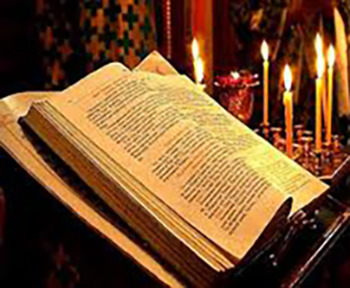
John 12:17-50
17 Therefore the people, who were with Him when He called Lazarus out of his tomb and raised him from the dead, bore witness. 18 For this reason the people also met Him, because they heard that He had done this sign. 19 The Pharisees therefore said among themselves, "You see that you are accomplishing nothing. Look, the world has gone after Him!" 20 Now there were certain Greeks among those who came up to worship at the feast. 21 Then they came to Philip, who was from Bethsaida of Galilee, and asked him, saying, "Sir, we wish to see Jesus." 22Philip came and told Andrew, and in turn Andrew and Philip told Jesus. 23 But Jesus answered them, saying, "The hour has come that the Son of Man should be glorified. 24 Most assuredly, I say to you, unless a grain of wheat falls into the ground and dies, it remains alone; but if it dies, it produces much grain.
25 He who loves his life will lose it, and he who hates his life in this world will keep it for eternal life. 26 If anyone serves Me, let him follow Me; and where I am, there My servant will be also. If anyone serves Me, him My Father will honor. 27 Now My soul is troubled, and what shall I say? 'Father, save Me from this hour'? But for this purpose I came to this hour. 28 Father, glorify Your name. Then a voice came from heaven, saying, "I have both glorified it and will glorify it again." 29 Therefore the people who stood by and heard it said that it had thundered. Others said, "An angel has spoken to Him." 30 Jesus answered and said, "This voice did not come because of Me, but for your sake. 31 Now is the judgment of this world; now the ruler of this world will be cast out. 32 And I, if I am lifted up from the earth, will draw all peoples to Myself. 33 This He said, signifying by what death He would die. 34 The people answered Him, "We have heard from the law that the Christ remains forever; and how can You say, 'The Son of Man must be lifted up'? Who is this Son of Man?" 35 Then Jesus said to them, "A little while longer the light is with you. Walk while you have the light, lest darkness overtake you; he who walks in darkness does not know where he is going. 36 While you have the light, believe in the light, that you may become sons of light. These things Jesus spoke, and departed, and was hidden from them. 37 But although He had done so many signs before them, they did not believe in Him, 38 that the word of Isaiah the prophet might be fulfilled, which he spoke: Lord, who has believed our report? And to whom has the arm of the LORD been revealed?" 39 Therefore they could not believe, because Isaiah said again: 40 He has blinded their eyes and hardened their hearts, Lest they should see with their eyes, Lest they should understand with their hearts and turn, So that I should heal them." 41 These things Isaiah said when he saw His glory and spoke of Him. 42 Nevertheless even among the rulers many believed in Him, but because of the Pharisees they did not confess Him, lest they should be put out of the synagogue; 43 for they loved the praise of men more than the praise of God. 44 Then Jesus cried out and said, "He who believes in Me, believes not in Me but in Him who sent Me. 45 And he who sees Me sees Him who sent Me. 46 I have come as a light into the world, that whoever believes in Me should not abide in darkness. 47 And if anyone hears My words and does not believe, I do not judge him; for I did not come to judge the world but to save the world. 48 He who rejects Me, and does not receive My words, has that which judges him-the word that I have spoken will judge him in the last day. 49 For I have not spoken on My own authority; but the Father who sent Me gave Me a command, what I should say and what I should speak. 50
And I know that His command is everlasting life. Therefore, whatever I speak, just as the Father has told Me, so I speak.
Matthew 26:6-16
6 And when Jesus was in Bethany at the house of Simon the leper, 7 a woman came to Him having an alabaster flask of very costly fragrant oil, and she poured it on His head as He sat at the table. 8 But when His disciples saw it, they were indignant, saying, "Why this waste? 9 For this fragrant oil might have been sold for much and given to the poor. 10 But when Jesus was aware of it, He said to them, "Why do you trouble the woman? For she has done a good work for Me.11 For you have the poor with you always, but Me you do not have always. 12 For in pouring this fragrant oil on My body, she did it for My burial. 13 Assuredly, I say to you, wherever this gospel is preached in the whole world, what this woman has done will also be told as a memorial to her. 14 Then one of the twelve, called Judas Iscariot, went to the chief priests 15 and said, "What are you willing to give me if I deliver Him to you?" And they counted out to him thirty pieces of silver. 16 So from that time he sought opportunity to betray Him.
#orthodoxy#orthodoxchristianity#easternorthodoxchurch#originofchristianity#spirituality#holyscriptures#gospel#wisdom#faith#saints#holy week
1 note
·
View note
Text
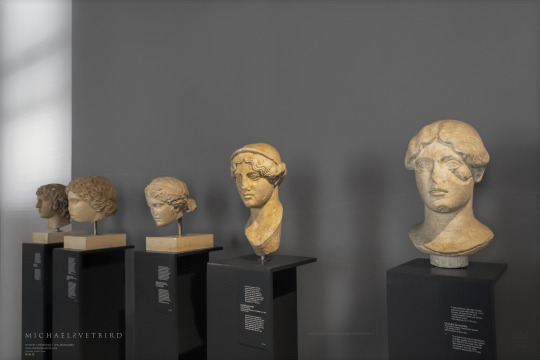
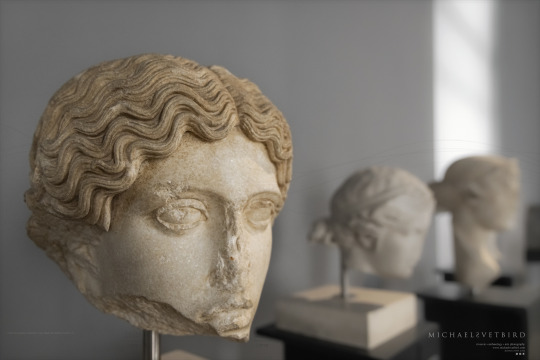
HEADS | Roman | Palazzo Massimo: 👉 Pic 1. Left to Right:
ANTINOUS [Bithynian favoured by the emperor Hadrian], https://en.wikipedia.org/wiki/Antinous 130-138 AD, Late Hadrianic period, Medium grained white marble [from Villa Adriana, Tivoli, Lazio].
AMAZON [Mattei type], Roman copy of a Greek original by Phidias, Hadrianic period [117-138 AD], Parian marble [from Villa Adriana, Tivoli, 1928].
HYPNOS [a personification of], May derive from a late Hellenistic model of the 2nd-half 2 BC, Hadrianic period [117-138 AD], Fine grained white marble [from Villa Adriana, Tivoli, 1928].
FEMALE DEITY [a separately-made head for a statue], Roman interpretation of a Greek Severe Style models, https://en.wikipedia.org/wiki/Severe_style Hadrianic period [117-138 AD], Pentelic marble [from Villa Adriana, Tivoli, 1892].
FEMALE DEITY [a separately-made head for a statue], "Reminiscent of Greek models of the Attic school ca 460 BC", Hadrianic period [117-138 AD], Fine grained white marble [from Villa Adriana, Tivoli, 1927].
👉 Pic 2. Close-up of the Amazon's Head: "The head belongs to a group of Roman copies of a model generally attributed to Phidias" [Sanctuary of Artemis at Ephesos]: Amazon Mattei type from Cryptoporticus between the Libraries and the Stadium of Villa Adriana in Tivoli [Lazio], https://villae.cultura.gov.it/en Found in 1928, Hadrianic period [117-138 AD], Parian marble [Txt ©MNR PM].
Palazzo Massimo, Museo Nazionale Romano | MNR PM [First Floor, Sala VI.] • Web : https://museonazionaleromano.beniculturali.it/en/palazzo-massimo • FB : https://www.facebook.com/MNRomano • IG : @museonazionaleromano • X : @MNR_museo
MNR PM | Michael Svetbird phs©msp | 06|23 6300X4200 600 [I., II.] The photographed objects are collection items of MNR PM, photos are subject to copyrights. [non commercial use | sorry for the watermarks]
📸 Part of the "HEADS.Sculpture" MSP Online Photo-gallery:
👉 D-ART: https://www.deviantart.com/svetbird1234/gallery/78520831/heads-sculpture
👉 FB Album: https://www.facebook.com/media/set?set=a.1400262423675664&type=3
#rome#ancient rome#palazzo massimo#museo nazionale romano#villa adriana#hadrian's villa#tivoli#ancient sculpture#sculpture#antiquity#ancient#archaeology#museum#mythology#greek mythology#art history#antiquities#ancient world#hadrian#heritage#goddess#deity#amazon#heads#photo gallery#art photography#archaeology photography#sculpture photography#museum photography#michaelsvetbird
1 note
·
View note
Text
Horses in Hellenic Languages
*íkkʷos - Proto-Greek
𐀂𐀦/𐂃 (i-qo/ikkwos) - Mycenaean Greek
Ἴκκος - Ionian
Ἴππος - Aeolian
Ἵππος - Ancient Greek
Ἄλογον - Byzantine Greek
Ἄλογον - George Sphrantzes
Φάρα/Ἄλογον/Ἵππος - Digenis Akritas
Ἄλογο - Demotic Greek
Ἵππος - Katharevousa
Άλογο - Modern Greek
Ampàri - Salentino Italiot
Πράμα - Northern Epirot
Φαρί/Μπεγίρι - Cretan
Αλόγο - Maniot
Αόγο - Tsakonian
Άλογον - Old Athenian
Αγέλ̑᾽ - Pierian
Άλουγου - Naoussiot
Aluğu - Patriot
Άτι/Άλουγου - Sarakatsani
Άογο/Άλουγου - Samothracian
Άλοο - Trigliot Bithynian
Άογο - Propontian Tsakonian
Άλιγου - Tenediot
Παρίππα - Gyöldiot
Άλοα - Smyrniot
Ἄλοουν/Ἀτ̔άϊ - Lycian
Άλογο - Cappadocian
Άλουγου - Mistiot Cappadocian
Άλουγου - Malakopiot Cappadocian
Άβγο - Pharasiot
Άβγου -Tshukuriot Pharasiot
Άλογον- Pontic Greek
Aloğon - Romeyka
Алгу - Azovian Greek
Άππαρος/Άλοβον - Paphian Cypriot
Άππαρος - Cypriot Greek
Γτίσ̲/Γτουσ̲ - Cypriot Arabic
Apparo - Cypriot Turkish
Ἄτ - Karamanlidika
At - Tsalka Urum
Ат - Azovian Urum
Καλj - Arvanite
Άτου/Κάλου/Μπινέκου/Ντούρο - Aromanian
Callu - Megleno-Romanian
Κον/Μούλε - Pomak
Γράστ’ - Romani
Horses in Digenis Akritas
While reading the Escorial edition of Digenis Akritas, I came acrossed a lot of different terms for horses. The most interesting part is the parallels to the Greek dialects, so I wanted to take a minute to highlight some of these words.
-Words meaning Horse-
Φάρας/Φαρί - from the Arabic word "فَرَس". This is the main term for horse in the story, and it largely comes about due to the story being about Byzantine-Arab interactions during the war; with the titular character being half Arab himself.
Cretan Greek uses the word φαρί
Ἵππος - from Ancient Greek ἵππος. Largely used in the Grosferrata edition by Greek speakers to contrast the Arabic φάρας.
Ἄλογον - from Koine ἄλογον (unspeaking animal). This is the vernacular Byzantine word for horse.
Ἱππάριν - from the Ancient Greek diminutive ἱππάριον. In the Escorial edition, this is seemingly derogatory as the horse in question came from a woman that challenged Akritas (prompting him to emasculate and disgrace her)
-Words related to horses-
Καβαλλικεύω - ‘to mount’ from the Late Latin “caballicare”from the word“caballus” meaning horse. Replacing the original Greek word ἐπιβαίνω
Γρίβας - literally meaning grey horse. From Gothic 𐌲𐍂𐌴𐍅𐌰 (grēwa) meaning grey.
Μαῦρος - literally referring to a black horse. From the Ancient Greek word μαῦρος meaning black. This one is interesting as the horse is usually called grey except for a few instances where it’s referred to as black.
-Akritic Poetry-
While not part of the story of Digenis Akritas, there is one occurrence from an Akritic poem called ‘The Song of Armouris’ that features an interesting word.
Παρίππιν - referring to a pack horse coming from the diminutive παρίππιον from παρίππος (παρά + ἵππος). Featured in Latin as parhippus and later in Hungarian as paripa.
One of the 15 words recorded of the Greek spoken in Gyölde (modern day İncesu in the Manisa province, Turkey)
7 notes
·
View notes
Text
"Kemetic How-to Guide: Who Was Antinous?"
youtube
He was prayed for dead children too ?! Hazel-nuts as offerings, why not? Interesting!
#antinous worship#modern antinous#antinous the lover#antinous the liberator#antinous#cult of antinous#the bithynian boy#Youtube#studyblr#study#history#ancient rome#ancient egypt#ancient greece#deification#demi god#antinous daimon#daimon#agathos daimon#greek polytheism#hellenic polytheism#polytheism#greek paganism#paganism#pagan#neopaganism#neopagan#lgbtqia#gay#queer
20 notes
·
View notes
Text
Young Jensen ackles looks like he drowned in the Nile during the festival of Osiris in 130 ce
36 notes
·
View notes